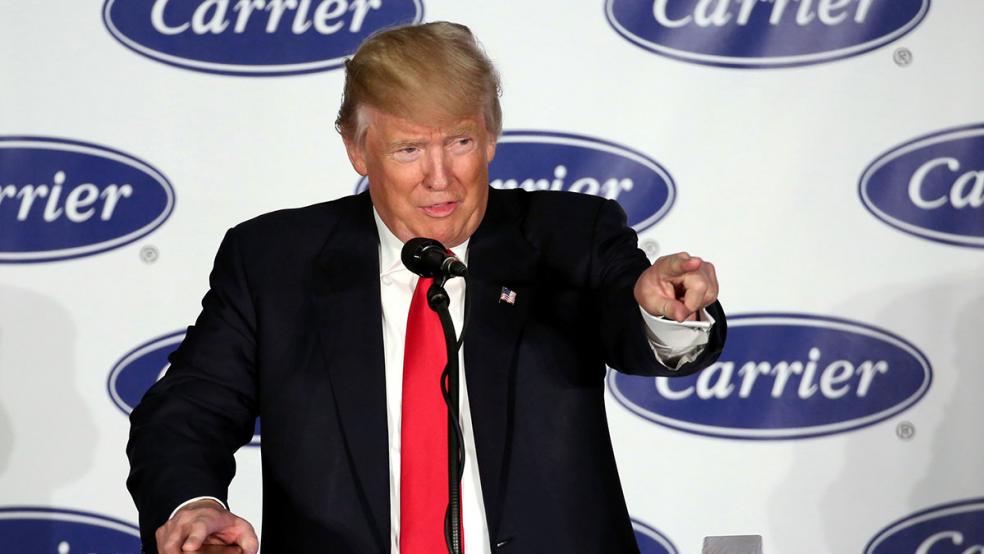When I first started teaching economics, one day a student came to my office to argue about how a multiple test question was graded. He believed his answer was correct and explained why, but I disagreed. However, the student would not give up; he kept arguing and began to get angry. Finally, to make it go away I took what seemed to be the simple route and gave him credit for the question.
That was a mistake. It turned out the student knew lots of other people in the course, and within three or four hours at least 20 students who had marked the same wrong answer showed up and demanded they be given credit as well. I had no choice but to give in. I then had to check all the answers for the 300+ students in the course to make sure everyone was treated the same, and in the end the question was essentially nullified. That was unfair to those who answered correctly. Once I made that first fateful choice to take the easy way out there was no way to be fair to everyone.
Related: Trump Gets a Big Win With Carrier, but Some Conservatives See a Loss
There is a lesson here regarding Trump’s announcement that he is essentially bribing Carrier with tax cuts to keep jobs in the US. What is going to stop other firms who are thinking about moving jobs outside the US from demanding the same treatment? If they are denied, how is that equitable? To make it worse, this will induce firms who have not yet investigated moving jobs elsewhere to do so, and to make a case for tax breaks whether they are truly thinking of leaving or not. If they are denied, some firms that might never have thought of moving might end up doing so after investigating this option and finding it will save them money.
There is another way in which the Carrier deal causes inequities that has largely been overlooked. In reporting the cost of the jobs that will be saved, most outlets have noted that Indiana will give Carrier $7 million in tax breaks to save 800 jobs (though 1300 are still going to Mexico), which works out to $8,750 per job over a ten year time-period. But that is not how economists measure costs. To measure the cost of the policy, we must evaluate the “opportunity cost” – the highest valued alternative use of the $7 million.
Remember that states, unlike the federal government, must run a balanced budget. Thus, if a state gives a company tax breaks that weren’t in the original budget, the tax cuts must be paid for by either raising taxes or cutting government programs. Suppose the tax cuts are paid for by cutting a program essential to low income households. Is the value of the saved jobs larger than the value of these social programs? Is this equitable?
Related: Carrier Gets State Incentives, Trump Pledge for Keeping U.S. Jobs
Personally, I would view the cost of the program quite differently if it were financed by tax increases on the wealthy – they wouldn’t have to give up much at all – rather than through cuts to essential social programs. Similarly, if the result were to cut a program of little or no societal value, then the evaluation of the overall impact would be different. At this point, we simply don’t know exactly how the tax cuts for Carrier will be paid for – what will be given up elsewhere – so there is no way to evaluate the true cost of this program and the cost of all the other firms that will demand similar treatment. I do have a strong suspicion, however, that increasing taxes on high-income households will be off the table.
Finally, as has been widely discussed, the Carrier deal can also be opposed because it interferes with market adjustments. Democrats generally argue that we should let competitive markets do what they do, and provide generous assistance to workers who lose jobs as markets adjust to shocks, new technology, changes in preferences, and international specialization. Republicans have, in the past at least, agreed government should not meddle in; they claim to be more “market fundamentalist” than Democrats.
The difference is that they are not as willing to embrace generous, widespread social assistance for those who are struggling to make ends meet. The Carrier deal marks a departure from the idea that painful as it is – pain that Democrats would like to ease significantly through social programs – the government should not interfere in markets.
But perhaps the more important reason to oppose the Carrier deal is that it represents cronyism. As Tyler Cowen explains:
Related: Sanders to Trump: Use Defense Contracts as Leverage for Carrier Jobs
“We don't know exactly what the company is getting. There's plenty of talk that the reason Carrier went along with the deal was because they were afraid their parent company would lose a lot of defense contracts. So this now creates the specter of a president always being willing to punish or reward companies depending on whether or not they give him a good press release. …
Crony capitalism is a system where businesses who are in bed with the government and who give the president positive press releases are rewarded and where companies who oppose or speak out against the president are, in some way, punished.”
We should do what we can to create an environment that will attract good jobs to the US and keep the jobs we have, and there are ways to create broad-based incentives that will induce firms to locate or stay in the US. But having the president negotiate with individual firms, with rewards to cronies who benefit him in some way and penalties for those who don’t, is not among them.






